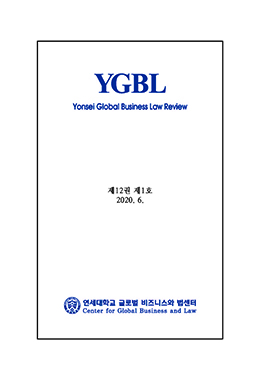민법은 제398조에서 ‘배상액의 예정’이라는 표제 하에, ‘손해배상액의 예정’을 규율하는 조문을 두고 있다. 학설과 판례는, 위약금 약정에 관하여 손해배상액 예정과 위약벌로 나뉜다고 보고 있지만 양 개념 구별의 일관된 기준이 없으며 각 사안에서 이를 판단하는 법원의 판단에 의하여 좌우되는 실정이다.
대상판결에서는, M&A 양해각서에서의 ‘이행보증금’ 약정에 관한 판단이 주요 쟁점이었다. 1심, 2심 법원은 이행보증금의 법적성질을 ‘위약벌’로 보고 전체 금액 그대로 매도인측에 몰취된다고 판시하였다. 그러나 대법원은 이행보증금의 법적 성질을 ‘손해배상액의 예정’으로 보고 그 금액이 부당히 과다하다고 판단하여 파기환송 하였다. 대상판결에서도 이행보증금(위약금)의 법적 성질에 관한 일관되고 명확한 구별기준과 근거를 발견하기 어렵다.
이에 본고에서는, 위약금 구별기준에 대한 대상판결에 판시에 관하여 비판적으로 검토하면서, 현행 민법상으로는 손해배상액 예정과 위약벌의 법적 성질에 대한 판단은 원칙적으로 ‘손해배상액 예정’이 되어야 한다는 견해를 제시하였다. 다만, 이에 대한 전제로 법원에 의하여 손해배상액의 예정이 손쉽게 감액되어서는 안 되고 극히 예외적인 경우에 신중하게 하여야 한다는 점을 지적하였다. 또한, 법무부에 의하여 제시된 바 있는, 민법 개정시안에 따라 향후 민법 제398조의 개정 필요성이 있으며, 민법이 개정된 후에는 ‘손해배상액의 예정’과 ‘위약벌’의 구분하기보다 통합된 개념으로서 ‘위약금’으로 파악하면 족하다는 견해를 제시하였다.
Article 398 of The Civil Code governs ‘liquidated damages.’ Various theories and precedents suggest that the ‘agreed payment for non-performance’ consists of ‘liquidated damages’ and ‘penalty.’ However, no consistent standard exists for distinguishing the two concepts, and the outcome of each case depends solely on the judgment of the court.
In the case, 2012다65973, the Supreme Court judged the ‘performance deposit’ agreement in the M&A Memorandum of Understanding to be the main issue. The courts of the first and the second trials judged the legal nature of the performance deposit as a ‘penalty’ to be borne by the seller. On the other hand, the Supreme Court instead ruled its nature as ‘Liquidated damages’ and found the amount unreasonably excessive. However, even the Supreme Court ruling do not provide clear and consistent standards for distinction nor a rationale for the legal nature of performance deposit(Agreed Payment for Non-performance).
This article critically reviews the Case’s judgment on the standard for discrimination regarding ‘liquidated damages.’ It also argues that the legal nature of the penalty and damages should be interpreted as ‘liquidated damages’ per the current Civil Law. However, it also points out that the court should not easily reduce the amount of damages, and only do so in exceptional cases and after careful considerations. Also, the article argues in favor of revising the Civil Code according to the Civil Code Revision Proposal offered by the Ministry of Justice. It also suggests that after the said revision, the currently distinct concepts of ‘liquidated damages' and ‘penalty’ should merge into a single concept of ‘agreed payment for non-performance.’




